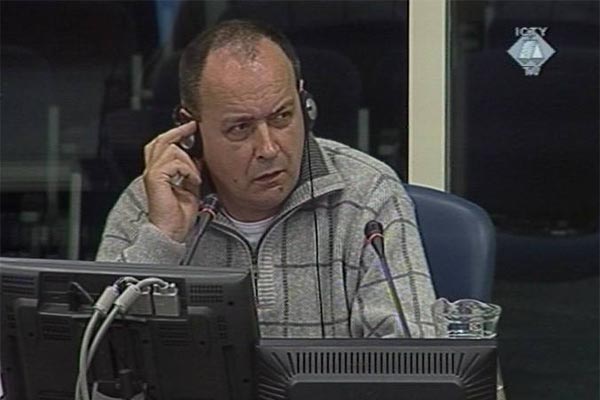Home
INVESTIGATION OVER THE “FIGHTERS HELPING THE ENEMY”
Following an order by Drago Nikolic, the Zvornik Brigade Military Police brought in, questioned and filed criminal reports against two Serbian soldiers who “helped the enemy”: four Muslim youths who had survived the execution in Branjevo. There were “rumors and stories” about mass killings after the fall of Srebrenica but nobody ordered an investigation into the allegations
 Nebojsa Jeremic, witness in the trial of the former military and police officials charged with the Srebrenica genocide
Nebojsa Jeremic, witness in the trial of the former military and police officials charged with the Srebrenica genocide In July 1995, Drago Nikolic, former VRS Zvornik Brigade security chief now standing trial for the Srebrenica crimes, signed a criminal report against two of his soldiers – Nesko and Slobodan Djokic. They were suspected of “helping the enemy” and were questioned by the Crime Prevention Department of the military police. Nebojsa Jeremic was a member of this unit. He testified today as a prosecution witness at the trial of Bosnian Serb military and police officers charged with crimes in Srebrenica and Zepa,.
Several days after the fall of Srebrenica, Jeremic said, father and son Nesko and Slobodan Djokic were brought to the barracks. Drago Nikolic, who was the witness’s superior officer at the time, said that the two men under arrest were “soldiers who were helping the enemy”. Criminal reports had to be filed against them.
This was done after Jeremic and two of his colleagues questioned the two Djokic men. Drago Nikolic was present during the questioning of Djokic junior, the witness said. In his words, when the youth at first refused to speak, Nikolic “slapped him in the face”. After that, Djokic admitted that he and his father had given water and food to four Muslims and that they had wanted to help them cross the confrontation line.
The same Service that had been established in the Zvornik Brigade military police under the command of Miomir Jasikovac, went on to question the four Muslims who had allegedly been helped by the Djokics. “Above all, they looked scared”, Jeremic said, adding that the four young men were “thin” and that their clothes were “torn”.
The Department then set up the “line-up” for the four Muslims to identify the two Djokics. After that, all of them were held in the barracks detention unit. Jeremic couldn’t tell he Chamber where exactly and how long they were held there or what happened to them afterwards. On 26 July 1995, Jeremic went to the Zvornik municipality to work there for three months and never saw them again. The indictment, however, states that the four young men who had survived the execution at the Branjevo farm, were detained in the Zvornik Brigade barracks and were then executed. Their names are listed in the indictment against the six Bosnian Serb military and police officers.
Jeremic described that “there were rumors and stories circulating in those days” about mass murders in Orahovac and Pilica. He was not aware whether anyone in the brigade ever ordered this to be investigated.
In his cross-examination, Drago Nikolic’s defense tried to point to the fact that two of the four Muslims were members of the BH Army. Drago Nikolic was in “a particularly stressful” situation in those days because some of his “close relatives” had been killed, the defense claimed. The witness said that he remembered that eight Zvornik Military Police officers had been killed in that period. One of them was Nikolic’s relative. He allowed the possibility that the Zvornik Brigade security chief had been “under stress” when he had slapped the accused soldier.
Linked Reports
- Case : Popovic et al. - "Srebrenica"
- 2007-04-23 A BAD TIME AND PLACE TO TAKE UP A RIFLE
- 2007-04-19 WHO OWNED THE FARM IN BRANJEVO WHERE PRISONERS WERE EXECUTED?
- 2007-04-18 THE ORDER ON “ACCOMMODATION” DISAPPEARED
- 2007-04-25 WHO WAS ON DUTY AT THE FORWARD COMMAND POST?
- 2007-04-27 PROOF “HANGING BY A THREAD”
- 2007-11-05 UNPROFOR USED AS ‘HOSTAGE AND SHIELD’
